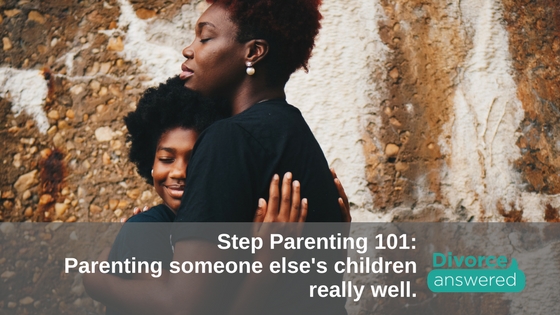Step parenting 101: parenting someone else's children

Whether you are becoming a step parent for the first time or for the second or third time, it will always be new and unchartered territory. Rachael Scharrer, divorce expert, coach and founder of DivorceAnswered.com.au explains that as each marriage is different, so too is each relationship. The relationship that you have with your new partner’s children as their step-parent will be different for each family and couple.
I remember my friends telling me how mean they were to their step-mother. They tried so many tricks and ways to be as cruel as they could be to have her leave their father. Fortunately, the relationship between the adults was so strong that many decades later, they are still together sharing wonderful memories and bond with the now adult children and their children.
Navigating the step-parent waters can be incredibly murky, but it is possible. As a parent who has recently partnered and in consultation with the new partner about becoming a step-parent, here is a guide for optimal step-parenting:
- DISCUSS WHEN AND HOW TO PARENT. Talk with your partner about how you want them to be involved as a step-parent parenting your children. When I ask my partner to “back me,” I mean “support me.” A new partner or step-parent yelling at my children is a big ‘no no.’ What I do expect my partner to say “please listen to your mother.”
- DISCUSS WHEN IT IS OK TO STEP IN. Talk with your partner about when you want them to step in when you get frustrated, angry or tired. You may say to your partner that XXX. Best to be prescriptive.
- CO-PARENT. The parent and step-parent need to ensure that they are parenting similarly, keeping to an agreed routine and have similar boundaries. While the parent may be more set in their ways with how their child should be parented, they should also be open to the suggestions from the step-parent. This is a great opportunity to demonstrate to the children how two adults can effectively parent a child
- CHILD-LEAD AND CHILD-FOCUSED. As a step-parent, be child-lead. Don’t force your hobbies, ideas or interests on the children. Get to know the child and their interests and as the adult, take an interest in what motivates the child
- KNOW YOUR ROLE. As a step-parent, your role is to be a friend and a support to the child. You are also there to be a positive, influential male/female role model. Ensure that your behaviour reflects this position of importance. Your role isn’t to come in heavy handed with discipline. Instead, appeal to the child’s better nature for better behaviour. You may even become a confidant to the child
- HOLD YOUR CRITICISM. As a step-parent, don’t criticise the other parent as a person, don’t criticise their parenting skills or their housekeeping skills. Parenting is hard and a juggle every day. Having a partner set high expectations which may not be achievable could create unnecessary challenges or stress in the relationship
- BE AN ADULT. A single parent doesn’t want an adult child. They want an adult and an equal. Burdening your new partner with financials, washing and chores (or generally being high maintenance) is a sure-fire way to ensure the end of the relationship (and your role as a step-parent)
- DATE YOUR PARTNER. Both the parent and step-parent need to ensure that they invest time into their relationship without the children. Your priority as a step-parent is primarily to support the other parent and the secondary priority is to support the children
- COMMUNICATE. At any time when you are unsure, talk with your partner. Parenting and step-parenting isn’t about keeping secrets, it is certainly about ensuring that you are both parenting similarly for consistency. Children can be cheeky, tell fibs or try to drive a wedge between the adults. By ensuring that you are open with each other, you will have greater trust in your partner and that will he harder for the children to break the bond
- WALK THE TALK. It is incredibly important that you do what you say you will do and be someone that the child can rely upon. Be supportive of both the children’s parents and their relationship with them. Step-parents need to be ‘like Switzerland’ – be impartial where necessary, don’t be inflammatory, keep clear boundaries and limitations and, most of all, have fun!
Parenting and step-parenting is a blessing. This is an opportunity to right the wrongs that you may have made in the past, start fresh with an amazing support person and an opportunity to positively co-parent. Step-parenting allows you to make a positive, lasting and life-long impression on the children and help shape them to become amazing adults.
Disclaimer
This is general advice only and is not provided as legal advice. If you have a legal issue, you should contact a lawyer and/or accountant before making a decision about what to do or applying to the Court. DivorceAnswered.com.au cannot provide legal advice. If you have an emergency situation, please contact Emergency '000'. © Divorce Pty Ltd
